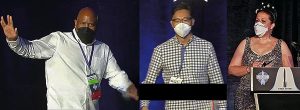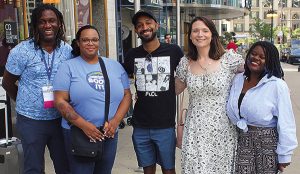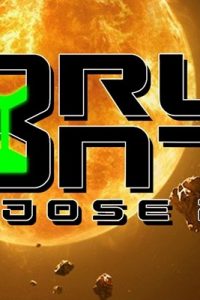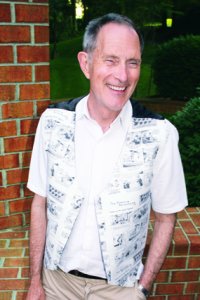Chicon 8 Report and 2022 WSFS Business Meeting
![]()

Chicon 8, the 80th World Science Fiction Convention, took place September 1-15, 2022 at the Hyatt Regency Chicago in Chicago IL. Guests of honor were Steven Barnes, Tananarive Due, and Erle Korshak (posthumous), with special guests Eve L. Ewing, Gene Ha, and Eric Wilkerson, plus fan guests of honor Edie Stern & Joe Siclari. There were 3,574 in-person warm bodies and 1,150 virtual members (whose memberships overlap with in-person attendees), plus another 639 and counting who have since signed in to watch replays. Adding 1,606 supporting memberships and 513 virtual-only memberships, total Chicon 8 membership comes to 6,500. Chicon 8 was the second hybrid Worldcon – CoNZealand 2020 was the first entirely virtual Worldcon, DisCon III in 2021 was the first hybrid Worldcon – with major components for both in-person and virtual attendees. DisCon III reported 2,359 in-person warm bodies and 1,197 virtual with 4,989 supporting memberships, attending no-shows, and a handful of other sales, for total registered memberships of 9,293. CoNZealand had 2,556 attending virtually with 4,646 total registered.
Located north of Millenium Park, near the Riverwalk, the Hyatt comprised a straightforward set of towers over a labyrinthine underground with a lot of signage, providing ample room for all in-person programming and official events, as long as you could find it. The weather was mostly cooperative: balmy with occasional bursts of rain. The neighborhood offered a variety of dining choices, with more options a short car or train ride away. The hotel restaurant offered typical over-priced fare, but their two bars created a pleasant (albeit occasionally cramped) “bar con” experience. Masks, generally speaking, made spotting friends challenging, but mask use was not as strictly enforced as at DisCon III. The con “suite” (actually a meeting room) had easy grab-and-go fare and a separate room with table to eat at.
Programming started Thursday morning, with multiple streams including panels, convention tours, crafting events, gaming rooms, and more. Registration lines grew very long at peak hours but seemed to move smoothly.
At the Opening Ceremony, the Chi-Nations Youth Council did a land acknowledgement. The Big Heart Award was presented to Mark Linneman. Three First Fandom awards were also presented: the Sam Moskowitz Archive Award to Doug Ellis and Deb Fulton, the First Fandom Posthumous Hall of Fame Award to August Derleth, and the First Fandom Hall of Fame Award to George W. Price. A Special Committee Award went to the Internet Speculative Fiction Database.
PROGRAMMING

Program division leadership reported well over 700 in-person program items, including 356 panels, 200 table talks (kaffeeklatsches without kaffee, just klatsch), 63 readings, 39 workshops, and much more; plus 136 virtual panels, 75 virtual readings, 10 virtual meetups, and more, held via Airmeet. “We ran 60-minute sessions in 90-minute time slots (as DisCon did last year). The primary drivers for this decision were to mitigate access challenges with the Hyatt and to reduce the COVID risk due to crowding during the panel change times – especially in narrow corridors.” There were 759 program participants: 364 in-person, 163 virtual only, and 232 hybrid. “Instead of running the Retro Hugos, Chicon 8 decided to hold exhibits and program items focusing on 1946. One of the goals of this was to expand people’s awareness of who was active and what the issues were of that time period beyond what the average contemporary fan thinks of.” DisCon III featured roughly 500 program items, including an African Programme Stream; the CoNZealand schedule listed 612 items, down from 2019’s 1,218 items and 2018’s 771.
Chicon 8 listed 34 in-person items tagged with “children’s program.” DisCon III listed only seven items total with the “children” or “teens” tags. ConZealand featured three items on the children’s track, which was down from 37 in 2019, 18 in 2018. The schedule was available via the website interface, with areas of interest including academic, art, costuming & cosplay, gaming, science & technology, writing, and more.
The Masquerade was Saturday night, with interlude entertainment by Raks Geek. The Award for Best in Show went to Arwen’s Lament and Best in Show: Workmanship to the Ocean Goddess.
EXHIBITS & DEALERS’ ROOM

Larry Hallock of Ygors Books; Dealers Room: Sally Kobee, Ralph F. Smith with “Larry Smith, Bookseller”; Exhibits hall displays
The dealers’ room, with just over 60 vendors, included booksellers, publishers, jewelers, costumers, game vendors, and more. The space was large, with sizeable walking lanes, though somewhat disorienting. Jacob Weisman of Tachyon said, “Even though this one was smaller than usual and foot traffic was relatively light, the people who came through the dealer’s room definitely came to shop. In the end, we probably did comparable business to Chicon 7 in 2012, despite the falloff in attendance. We were very happy with sales, but it was just nice to get out of the house and see people.” Shahid Mahmud of Arc Manor said, “We had a very nice experience though missed some of our friends because they had elected to go to Dragon Con instead of coming to Chicon. At this point Dragon Con is in a league of its own, and is set for Labor Day weekend, so it seems short-sighted for any Worldcon Committee to select the same weekend for their event. Having said that, as I mentioned, we had a successful Woldcon, which was helped by two of our authors being up for awards: Alan Smale for the Sidewise award (for a piece we had not published) and Oghenechovwe Donald Ekpeki for his novelette, ‘O2 Arena’. These authors tended to sit with us when free which helped generate interest in our products. General foot-traffic in the room was on the lower side, I would say, but our own sales did well.”
ART SHOW

Over 70 artists participated in the Art Show, with 157 panels and 35 tables, plus displays for special guest and fan guests, and a room dedicated to the art collection of posthumous GOH Erle Korshak. The virtual art show was combined with the Artist Showcase and featured 44 artists. Best in Show went to Vincent DiFate for “The Outer Reach”; Best 2D to Eric Wilkerson for “Alien Lives Matter”; Best 3D to John Douglass for “Green Autoe Tanker”; and Directors’ Choice to Lucy Synk for “Strange New Worlds”.
PARTIES
Over 40 in-person parties were listed on the Chicon 8 site, some of them repeat events, such as Winnipeg in 2023, which had four of five nights. “We followed the local Chicago tradition of making sure the parties were recognized by having attendees vote for who should receive our Party Awards. We gave these out at Closing Ceremony, and congratulate Glasgow 2024, Discon III, the Royal Manticoran Navy, and Seattle in 2025 on their awards.” Other parties included the Tune in Tomorrow book launch, the Zombies Need Brains publisher party, and the Chengdu Worldcon 2023 Welcome party.
CON PUBLICATIONS

The souvenir book was 162 pages, with cover art and some interior images by Eric Wilkerson, plus illustrations by Gene Ha. Contents included a greeting from the chair, sections on GoHs and special guests, a list of Hugo Awards winners since ’53 and a list of World Science Fiction conventions since ’39, the full committee list, a WSFS business material insert, and an In Memoriam page. The “pocket program” was only available online or as a PDF, and the program grid was printed out on 11” x 17” paper, much to the consternation of many.
Star Chart, the convention newsletter, had early and late editions, for a total of 48 posts. The newsletter featured site selection results, programming updates, events, useful information, the Masquerade winners list, and more.
HUGO AWARDS

The 69th Hugo Awards Ceremony took place at 8:00 p.m. on Sunday, September 4, 2022 in the Grand Ballroom at the Hyatt Regency Chicago. The event was also livestreamed on YouTube. The masters of ceremonies were Charlie Jane Anders & Annalee Newitz; closed captioning was provided by Google.
Newitz and Anders opened by welcoming everyone to the event, celebrating the idea of being together as a community, which was met with exuberant applause. “This is about everyone in our community…. We want to celebrate all of us, not just the nominees and winners, but everybody who is here. If you are sitting in this room, if you are watching the livestream, if you are hearing these words via the great mind storm between the asteroid belt and the Oort cloud, you are part of this community!” Members of the Chi-Nations Youth Council read the land acknowledgement (co-written with a city official) and encouraged audience members to “get involved with some of the Native communities in your area” as well as to look into the Native communities of Chicago. Member Anthony Tamez- Pochel noted the acknowledgment as historic, saying this was “the first time that the city of Chicago did this.”
Hugo Award base designer Brian Keith Ellison discussed the inspiration for this year’s design, as well as the materials. Then the first award of the night, the Astounding Award for Best New Writer, was presented to Shelly Parker-Chan, who accepted via video. Parker-Chan talked about her initial hesitation to write fiction: “I wanted to write, but I didn’t think I knew myself well enough, I didn’t think I had anything to say…. What I discovered, though, is that writ ing could be a process, not just of finding your characters, but of finding yourself.” She finished by saying, “If you want to write, don’t wait till you know enough or you’ll be enough to get started. Just get writing.” She thanked the people who taught her “to just write what you like,” the people at Tor “for championing queer SFF,” as well as people at Pan Macmillan, her agent Laura Rennert, with special shout-outs to C.L. Clarke and Tasha Suri. She thanked fellow nominees and the Chicon organizers.
 TAFF delegate Fia Karlsson presented the Lodestar Award for Best Young Adult Book, which went to The Last Graduate by Naomi Novik. Novik accepted by audio, saying, “I love YA myself because it deeply values and puts a priority on pleasure and immersion without ever closing the door to complexity. For me the YA genre in particular is about becoming, about focusing on characters finding out who they are going to become, and that’s a story that I myself never grow tired of, because we are all always still on that journey.”
TAFF delegate Fia Karlsson presented the Lodestar Award for Best Young Adult Book, which went to The Last Graduate by Naomi Novik. Novik accepted by audio, saying, “I love YA myself because it deeply values and puts a priority on pleasure and immersion without ever closing the door to complexity. For me the YA genre in particular is about becoming, about focusing on characters finding out who they are going to become, and that’s a story that I myself never grow tired of, because we are all always still on that journey.”
Best Fan Artist went to Lee Moyer. Seanan McGuire accepted for Moyer, who spoke about beginning his involvement in fan art 40 years ago, “making terrible art and worse jokes.” McGuire said, “Thank you so much for this honor, I know Lee is going to be thrilled.”
The Best Fan Writer Award went to Cora Buhlert. Buhlert accepted via video, giving a brief overview of the history and expansion of fandom going back to the 1920s, culminating in a “great and colourful tapestry we call fandom, a tapestry that is wrapped around the entire world by now.” Buhlert added, “I’m honoured that tonight, the threads I added to the great and glorious tapestry that is fandom have been recognised by you.” She thanked Gideon Marcus and Galactic Journey, Jessica Rydill, Mike Glyer and File770, fellow finalists, parents, and more.
Mary Anne Mohanraj presented the Best Fancast Award to Our Opinions Are Correct, hosted by Anders and Newitz. Grateful, Anders talked about nearly quitting the podcast, and how much the support from the community means to them. Newitz described the community as being in “the creamy center of the Venn diagram that includes overlapping circles of science fiction, science, politics, milk chocolate, and dad jokes.” They thanked producer Veronica Simonetti and included her as a recipient of the award. They also thanked transcriptionist Keffy Kehrli, Chris Palmer who does the music, and Jesse Burns.
Best Fanzine went to Small Gods by Seanan McGuire and Lee Moyer. McGuire said, “I’ve been a fan of Lee’s art since I was a teenager. Having him ask if I’d work with him was a dream…. Lee is faster, more considerate, and more thoughtful than I think most of us will ever know.” McGuire called Moyer a “master of his craft” and thanked the audience.

Best Semiprozine went to Uncanny, published and edited by Lynne M. Thomas & Michael Damian Thomas, with managing/poetry editor Chimedum Ohaegbu, non-fiction editor Elsa Sjunneson, and podcast producers Erika Ensign & Steven Schapansky. Sjunneson accepted with Caroline Yoachim, who accepted for the Thomases, who were at a children’s hospital nearby with their daughter Caitlin. “Every community has its issues and we acknowledge that there is work to do to improve the science fiction and fantasy community, and to make it as welcoming as possible. But we also don’t want to forget that when this community is at its best, it’s filled with compassion, joy, imagination, friendship, and love.” They thanked their staff, Chicon members, Hugo Awards staff, their readers, and Caitlin. Sjunneson noted that this was her last year with Uncanny and thanked her non-fiction contributors. Yoachim read a note from Ohaegbu, who also mentioned that this was her last year with the magazine and expressed gratitude.
Joe Siclari & Edie Stern presented the Hugo Award for Best Professional Artist to Rovina Cai.
Neil Clarke won Best Editor Short Form, who said, “There’s a ten-year-old boy in the back of my head screaming right now, because that’s how old I was when I started reading short fiction. And it’s been life-saving at times, so thank you to everyone who writes it.” He thanked his family – particularly his cousin Johnny, tearfully saying, “I lost him; he was my biggest fan, he would be thrilled.” Clarke thanked “Sean and Kate who are my right and left hand at Clarkesworld” and the rest of the staff, Storycom, the writers, translators, and artists who contribute to the magazine, and the audience.
Ruoxi Chen won the Best Editor Long Form Award. Chen talked about being grateful to return to the community, saying, “You feel like family.” She thanked Kim-Mei Kirtland, Diana Pho, who “opened so many doors for me,” and others who “also came from marginalized communities, who were the only ones in the room for a long time.” Chen thanked family and friends, and her authors: “You are so brilliant; I don’t understand how youdo what you do.” Chen described a book as being made by a “huge team of people” and thanked the people she has worked with.
Anders and Newitz introduced the In Memoriam, recognizing fans, authors, editors, and artists who died in 2021 and 2022, which ran while Cheshire Moon performed “Callenwood”.
Theo Germane presented Best Dramatic Presentation Short Form to The Expanse: “Nemesis Games”, written by Daniel Abraham, Ty Franck & Naren Shankar, directed by Breck Eisner. Glenton Richards, a staff writer for the show, accepted, thanking the creators, as well as the fans “who not only watched our show but also saved us from cancellation.”
Germane presented Best Dramatic Presentation Long Form to Dune, screenplay by Jon Spaihts, Denis Villeneuve & Eric Roth; directed by Villeneuve and based on the novel by Frank Herbert.
Hugo Awards Administrator Kat Jones took the podium to talk about the Hugos, the people who make the awards happen, and awards statistics. Jones exhorted members to vote, saying “at the nomination stage this year the final spot on the ballot was decided by only one or two votes in elevenof the nineteen categories.”
Alec Nevala-Lee and his daughter Beatrix presented the award for Best Related Work to Never Say You Can’t Survive by Anders. Anders talked about “showing up and being present,” saying that these make for good conversation, and that they “also make for good writing: when you can hear your own voice clearly…. The people who are most traumatized right now are the people whose voices most need to be heard, and the people who most need to hear their own voices.” Anders said she wrote this book to “help us all show up and be present, and to build our own stories when the world goes sour.” She thanked Tordotcom, agent Russ Galen, Curtis Mayfield, and Newitz “who has taught me so much about how to be both present and positive.”
The Hugo for Best Graphic Story or Comic was won by Far Sector by N.K. Jemisin, art by Jamal Campbell. Jemisin thanked the individuals who worked on the project –- Jamal Campbell, Deron Bennett, Maggie Howell, Jamie Rich, Andy Khouri, Mark Doyle, and Gerard Way “who gave us all the original idea.” Jemisin also thanked the Hugo voters and the Far Sector fans.
The award for Best Series went to Seanan McGuire for Wayward Children, “I wrote these books for all the people who don’t get to see ourselves in books. For all the people who watch stories about kids that never look like them going on these wild and magical adventures. And for the people that I love, a lot of whom are in those categories, and who will say to me, ‘I don’t get to see me in a book, I don’t get to be in a book, adventures aren’t for people like me.”’
The winner of Best Short Story was “Where Oaken Hearts Do Gather” by Sarah Pinsker. Pinsker thanked the Thomases and the Uncanny staff, wife Zu, agent Kim-Mei, and family. “I don’t know anything about slime molds,” Pinsker joked (referencing Ursula Vernon’s speeches from the prior year), and instead presented her father’s autograph book from Chicon 3, which he’d brought to the convention at age 15 and “filled with autographs of everyone he met,” including a number of notable authors, such as Theodore Sturgeon and Anne McCaffrey. “There’s a clear line from my teenage dad being here and finding family and friendship and connections with all those authors that weekend and all of you…. That is, words strung together by one person and played on another person’s brain. It’s the coolest thing.”
Best Novelette went to “Bots of the Lost Ark” by Suzanne Palmer, whose wit had the audience laughing. “I can’t believe I’m here again,” she said. “My crushing imposter syndrome would really like to speak with the manager.” Palmer talked about the messiness of the world, saying “I want Bot 9 stories to be fun, a little bit funny, a little bit darkly funny, and an all-around good light but not substanceless adventure. But I also want there to be hope found within, the idea that even the proverbial little guy, with some derring-do and a little reckless improvisation, can make a difference.” Palmer thanked Neil Clarke, finishing by saying, “I love you all; I serve.”
A Psalm for the Wild-Built by Becky Chambers won the Best Novella Award. Newitz read Chambers’s speech, which talked about wanting to attend but falling sick. “When I got better… I couldn’t muster the energy or the courage to get on a plane and place myself in a crowd…. I’m soul-suckingly, bone-shatteringly tired.” Chambers exhorted listeners to rest when needed: “You do not need permission to rest. You do not have to justify your weariness. You do not have to earn the right to be alive, or safe, or comfortable. Or at least, you shouldn’t have to.”

Seanan McGuire & Amy McNally
Due & Barnes presented the Best Novel Award to A Desolation Called Peace by Arkady Martine. Martine said, “If A Memory Called Empire was about what to do about falling in love with a culture that was devouring yours, A Desolation Called Peace is about whether there are better answers than apocalyptic violence when you encounter something so other to you that it is incomprehensible.” Martine described these ideas as “questions I have been obsessed with for a very long time.” Martine spoke about Gonzalo Lamana’s article, “Beyond Exotization and Likeness: Alterity and the Production of Sense in a Colonial Encounter”, as being central to her novel. “A decade and a half later I’m still thinking about… about events that become so meaningless and existentially challenging that people considered truly horrific actions to make them stop…. Also I love military science fiction, I always have, and it’s a genre that doesn’t always feel completely receptive to people like me: female, queer, into people talking to each other as a plot point. So I wanted to write one that was for me.” She thanked readers, editor Devi Pillai, agent DongWon Song, coworkers, her father “who gave me science fiction in the first place,” and her wife Vivian Shaw, “Telling you stories is the delight of my life, and I couldn’t do any of it without you.”
WORLDCON 2023 AND BEYOND
The 81st World SF Convention, Chengdu WorldCon 81st, is scheduled for the Chengdu Century City New International Convention & Exhibition Center August 16-20, 2023, in Chengdu, Sichuan, China, featuring guests of honor Liu Cixin, Sergey Lukianenko, and Robert J. Sawyer.
The 82nd World SF Convention, Glasgow 2024, will be held at the Scottish Events Campus in Glasgow, Scotland August 8-12, 2024, featuring guests of honour Chris Baker, Claire Brialey, Ken MacLeod, Nnedi Okorafor, Mark Plummer, and Terri Windling.
–Arley Sorg & Liza Groen Trombi
2022 WSFS Business Meeting

The 2022 World Science Fiction Society (WSFS) Business Meeting at Chicon 8 had so many items on its agenda that it stretched into an ‘‘overtime’’ session on the final day. It adopted few new proposals, but ratified all business passed on from DisCon III.
Also ratified was the ‘‘E Pluribus Hugo’’ system for tallying nominations for the Hugo Awards. EPH was first passed in 2015 and ratified in 2016 as a reaction to the perceived ‘‘slate’’ voting of the so-called ‘‘Sad and Rabid Puppies’’ in 2015. The system first was used in 2017, and required an additional re-ratification vote this year that makes it a permanent change.
Although eight new changes to the WSFS Constitution were proposed this year, only two passed. Both must be ratified at the 2023 WSFS Business Meeting in Chengdu in order to take effect. Those that failed were recommendations for changes to the Hugo rules produced by a committee that appeared to be out of touch with popular sentiment.
First to pass was a proposal widely promoted on social media. This eliminates the ‘‘25% rule,’’ which requires that no award be given in a Hugo Award category if the number of votes cast in the final ballot for that category is less than 25% of the total number of final ballot votes cast for the Hugo Awards in a given year. There had been some concern that the shorter fiction categories were in danger of falling foul of this rule.
Instead the Business Meeting adopted a new Standing Rule to the effect that, should a Hugo category receive less than 10% of the total number of final ballots cast, in two out of three successive years, a motion to delete that category would be automatically put on the agenda for the following year’s Business Meeting. Because this new Standing Rule only triggers debate, and does not have any definite effect on the Hugos, it does not require ratification. Any motion to delete a category created under this rule would require the usual passage at two consecutive Worldcons.
The other successful motion was to create a new Hugo for ‘‘Best Game or Interactive Work’’. This follows the example set by the successful game category at DisCon III. If this proposal is ratified in Chengdu, the new category will be run for a trial period from 2024 to 2028, at which point a single additional ratification vote will make it permanent.
WSFS continues to work on the problem of complying with data privacy laws, which are an issue if information about members of an event in one country are to be passed to a subsequent event in another country. As part of this, the WSFS Constitution has been changed to make it clear that WSFS is a membership organisation, and that part of the cost of attending a Worldcon is your WSFS membership fee. You can also buy a membership to WSFS without attending Worldcon, and this gives you the right to vote in the Hugos and in Site Selection. One of the effects of this is that there will be no more confusion over whether someone selling their Worldcon membership can also sell their voting rights. It is now made clear that WSFS membership is not transferable (as is usually the case for membership organisations), but the right to attend Worldcon can be transferred to another WSFS member.
As is often the case, the meeting extended the Hugo Award eligibility for one year for a number of works that had limited availability. These were all movies: After Yang, Strawberry Mansion, Neptune Frost, and Mad God.
The Business Meeting discussed two resolutions relating to the war in Ukraine. The first expressed the Business Meeting’s solidarity with Ukraine and called for members to ‘‘boycott those who would platform or champion the illegal invasions.’’ The second explicitly condemned the 2023 Chengdu Worldcon’s Guest of Honor Sergey Lukianenko, calling upon the Chengdu ‘‘committee, fans and members to refuse’’ him as a guest of the convention. These are non-binding motions expressing opinions of the Business Meeting. Both passed by substantial majorities.
The meeting received the official results of the 2024 Worldcon and 2023 NASFiC site selection ballots, and the initial presentations of the winning Glasgow and Winnipeg committees respectively. The 2023 Chengdu Worldcon committee presented a progress report and answered questions.
Recordings of all the Business Meeting sessions are available on the Worldcon Events YouTube channel at <https://youtube.com/playlist?list=PL0oLnkb-s4YcY8C9jjM6DqLh0XEETXAh5>.
– Cheryl Morgan & Kevin Standlee
From the October 2022 issue of Locus.
 While you are here, please take a moment to support Locus with a one-time or recurring donation. We rely on reader donations to keep the magazine and site going, and would like to keep the site paywall free, but WE NEED YOUR FINANCIAL SUPPORT to continue quality coverage of the science fiction and fantasy field.
While you are here, please take a moment to support Locus with a one-time or recurring donation. We rely on reader donations to keep the magazine and site going, and would like to keep the site paywall free, but WE NEED YOUR FINANCIAL SUPPORT to continue quality coverage of the science fiction and fantasy field.
©Locus Magazine. Copyrighted material may not be republished without permission of LSFF.







